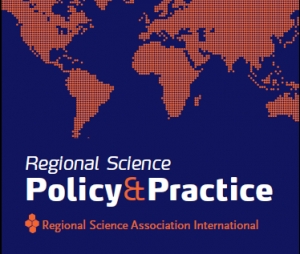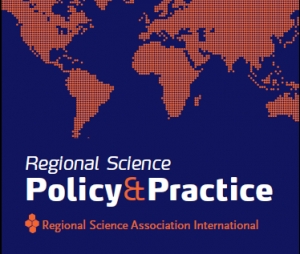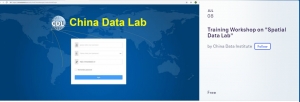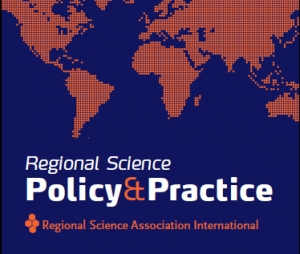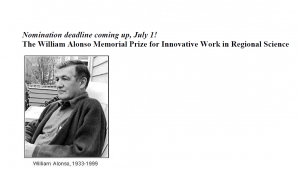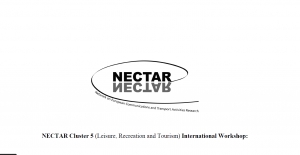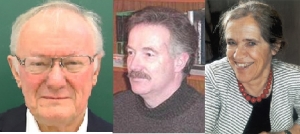Archives
Elisabete Martins
Extended Deadline for Abstract Submissions – North American Meetings of the Regional Science Association International, Pittsburgh, Pennsylvania, November 13-16, 2019
We have extended the deadline for abstract submissions by a few days. The new extended deadline is Friday, July 5.
Join us in Pittsburgh, Pennsylvania for the 66th North American Meetings of the Regional Science Association International (RSAI) sponsored by the North American Regional Science Council (NARSC). The conference will be held at the beautiful and historic Omni William Penn Hotel, November 13–16, 2019. You can learn more about the conference, submit an abstract, and register for the conference and workshops at the NARSC Website at http://www.narsc.org/.
This year the Spatial Econometrics Association (SEA) will be meeting in conjunction with us at the conference hotel. Special registration instructions for those of you who wish to attend the SEA sessions, in addition to the NARSC sessions, are provided below.
Click on the link to the conference section for general information on the conference. To register for the conference or submit an abstract/session online you must first login to the User Area. If you attended a NARSC conference over the past couple of years or are a member of a North American regional science organization, when you reach the login page of the User Area, you will be asked to enter your provided username and password. Otherwise, when you reach the login page of the User Area, you will be asked to click on a link and enter your e-mail address so we can check if you are already in our database. If you are in our database, your username and password will be e-mailed to you so you can login. If you are not in our database, you will need to register for a free NARSC user account and then you will be able to register for the conference and submit an abstract.
Once logged, you can change your password, update your profile, submit an abstract/session, register for the conference, and check the status of your registration. You will be able come to your account in the User Area subsequently using your valid username and password. In case you forget your password, just contact technical support at This email address is being protected from spambots. You need JavaScript enabled to view it. with your e-mail address and your password will be e-mailed to you so you can login.
Please note that there is a surcharge for individuals who are not members of RSAI. When you are ready to register for the conference please check your RSAI membership status where you can find a list of current RSAI members - https://www.regionalscience.org/index.php/join-us.html.If you have any questions regarding your RSAI membership status or would like to join RSAI please contact Elisabete Martins (This email address is being protected from spambots. You need JavaScript enabled to view it.) at the RSAI Central Office.
As you will see from the website, there is a special registration rate for individuals who wish to attend both the NARSC conference sessions and the sessions organized by the Spatial Econometrics Association (SEA). Alternatively, if you wish, you can register to attend just the NARSC Conference or just the SEA sessions. Those who register for just the SEA sessions will not be able to attend any NARSC sessions and vice-versa. When submitting your abstract please indicate whether you wish to have it considered for inclusion in the SEA sessions. The meeting of the SEA in Pittsburgh will coincide with the launch of the new 'Journal of Spatial Econometrics' that will be published by Springer-Verlag starting from January 2020
Individual papers and organized sessions must be submitted online in the abstract submission section of the website between now and JULY 1, 2019. The conference registration section is open and allows secure electronic financial transactions. Information about the workshops will be posted in late June. If you are potentially interested in attending any workshops it is suggested that you wait until information about them is available before registering for the conference. Be sure to consult the conference website for additional information and details.
Conference organizers welcome individual papers and organized sessions relating to a wide variety of topics that are included within the diverse realm of regional science. As usual, there will be a number of organized sessions. If you are interested in participating in one of these organized sessions, please contact the session organizers. Details about these can be found at http://www.narsc.org/newsite/conference/special-session-call-for-papers/.
We are an international scholarly organization that focuses on regional analysis, ranging from urban and spatial theory to applied problems in regional development, sustainability, environmental management, and rural land use. We are an interdisciplinary association, with members representing fields as diverse as economics, agricultural economics, public policy, urban planning, civil engineering, geography, finance, and demography. The annual North American RSAI conference is the premier regional science meeting in North America and attracts scholars and practitioners from around the world.
A block of rooms has been reserved at the Omni William Penn at the rate of $185 (plus applicable taxes) for a double-occupancy room. In addition, we have negotiated a special rate for of $119 (plus applicable taxes) for a limited number of student room. These will be available on a first-come, first-served basis. Please book the conference hotel through the NARSC website. By doing so, NARSC will get credit for your booking. Bookings can be made via a link coming soon.
If you have questions, here is contact information:
Local arrangements:
John Sporing (This email address is being protected from spambots. You need JavaScript enabled to view it.)
Program Chair:
Laurie Schintler (This email address is being protected from spambots. You need JavaScript enabled to view it.)
Overall Arrangements
Neil Reid, (This email address is being protected from spambots. You need JavaScript enabled to view it.)
We look forward to seeing you in Pittsburgh.
RSPP Call for Paper | Special Issue on Evidence-Based Policymaking: the use of information for integrated territorial policy development
This special issue will focus on the challenges of territorialising public policies and on the role of (big) data, information and technologies in planning and regional development. The lack of the territorial dimension in the formulation and implementation of sectoral policies, currently, coexists with efforts to implement decentralized policies. In this context, the development and evaluation of public policies faces an increasing number of challenges, not only because of the multidimensional nature of the problems, but also because of the unpredictability of factors and the way in which they interact. This justifies the need to involve a diversity of actors and knowledge and the use of information to better inform and support decision-making. The ability to integrate and articulate technical and political criteria with motivational and preferential criteria of policy takers are necessary and required conditions to make collective decisions policy effective, efficient and sustainable. Additionally, new (big) data, continuously generated by information and communication technologies, justifies a major research effort to identify innovative and integrated methodologies for better using this type of input in the definition of regional and urban development policy, adapting them to specific territorial contexts.
Thus, this special issue emphasizes the interactions between three dimensions: i) data and information; ii) tools and models; iii) policies and instruments. More and better territorial information: in the context of the definition of regional development policies, discuss the big data and the existence of limitations in its use and availability and reflect on the use of small samples and adaptive models to support decision-making; ii) Better Methodologies (Innovative and Integrated): assess how information and communication technologies (ICT) can be used to meet the needs and expectations of populations and foster regional development dynamics; iii) More effective regional development policies: identify the needs and challenges posed by policy makers, institutions and enterprises, as well as society in general, for the qualification of the territories and improvement of people's living conditions. The editors invite proposals for this Special Issue relating to any area of the three previous topics
Papers should be submitted to the regular review process of the journal until December 30th of 2019 at https://mc.manuscriptcentral.com/rspp. With a regular review process it is expected that the papers will be publish on the 3rd Issue of 2020. For guidance from the editors abstracts can be send to Elisabete A. Silva <This email address is being protected from spambots. You need JavaScript enabled to view it.> until December 15th of 2019.
The coordinators of the Special Issue
João Lourenço Marques This email address is being protected from spambots. You need JavaScript enabled to view it.
Elisabete Silva This email address is being protected from spambots. You need JavaScript enabled to view it.
RSPP Call for Paper | Special Issue on Urban Resurgence in European Cities
RSPP Call for Paper
Urban Resurgence in European Cities
Cities are drivers for economic growth and innovation that control knowledge, capital and communication on a global level. However, there are many challenges related to urban development within and across Europe cities. First, there are difficulties with achieving convergence across European areas. Some cities do not manage to benefit from the better economic, social or cultural structures nor from the improved living conditions related with urbanization and often experience a lack of economic growth, population loss and poverty. Second, cities that successfully underwent structural change and that manage to deal with technological transformation are experiencing not only the advantages of economic progress but also negative effects related with congestion, pollution, segregation, etc. The different historic and political background has led to different challenges that European cities face and also to different (institutional, financial, economic, social) resources available to appropriately enhance growth. In other words, European cities experience different type of challenges that require differentiated strategic approaches raising the standards in urban policy and planning requiring integrated, resilient, inclusive and sustainable solutions.
This special issue aims at contributing to the scientific discourse on urban development in Europe by emphasizing challenges and solutions for resurgence. Papers should have a focus on one of following topics:
- Resurgence in shirking cities
- Growth-oriented urban policies (Smart cities, innovation in cities)
- Urban resurgence in small and mid-sized cities
- The role of diversity and of the creative class for urban resurgence
- Cultural tourism and hospitality as instrument for urban resurgence
Papers should be submitted to the regular review process of the journal until December 20th of 2019. With a regular review process it is expected that the papers will be publish on the 1st Issue of 2020.
The coordinators of the Special Issue
Alina Schoenberg (This email address is being protected from spambots. You need JavaScript enabled to view it.)
Training Workshop on “Spatial Data Lab”
Training Workshop on “Spatial Data Lab”
Co-Organized by
China Data Institute
Geospatial Center for Social Sciences, Wuhan University
Wuhan University, Wuhan, China
Join us for the online workshop on July 8, 2019 at 8:30 PM EDT (New York Time)
- · Open platform for spatial data sharing with WorldMap, Wendy Guan, Harvard University
- · Open platform for data management with DataVerse, Gustavo Durand and Danny Brooke, Harvard University
- · Spatial data analysis with GeoDa and GeoDaSpace, Xun Li, University of Chicago
- · Drive data and AI with workflow tools, Alex Liu, RMDS/IBM
- · Integrate, Automate, Innovate Self-Service Analytics, Sandeep Saini, Grazitti
Note: The web conference in the morning will be open to public. Please click here for the online registration. After registering, you will receive an email notice containing information about joining the webinar.
For the full agenda of the workshop onsite, please visit:
https://projects.iq.harvard.edu/chinadatalab/event/training-workshop-“spatial-data-lab”
Call for papers | "Resensitizing cities: Urban Ambiances and Senses", Rio de Janeiro, Brazil, October 2-5, 2019
Dear colleagues,
Please find attached a call for papers for the conference "Resensitizing cities: Urban Ambiances and Senses" to be held in Rio de Janeiro, Brazil, from October 2 to 5, 2019
The deadline for the submission of full papers is 15 July 2019.
"Resensitizing cities" is an event that integrates the preparatory agenda for the UIA 2020, and will be promoted by LASC / Proarq UFRJ.
The aim of this conference is to investigate the practice of urban daily life and the study of rhythms of life, intertwined with the daily life of cities, on a small scale. Through the look at senses that interfere in uses and appropriations in the urban environment, we intend to deepen the thinking about strategies of articulation between the urban experience and the affectivity in the great metropolis.
The routine of the event includes the presentation of papers and also the accomplishment of experiences in the streets through a central result coming from the workshops of theoretical and practical reflections.
Conference web: https://workshoplasc2019.wixsite.com/ressensitizingcities?lang=en
Feel free to pass this notice on to colleagues and/or students! Thank you.
Cristiane Duarte and Ethel Pinheiro
RESENSITIZING CITIES urban ambiances and senses - october 2nd to 5th, 2019
RESSENSIBILIZANDO CIDADES ambiências urbanas e sentidos - de 2 a 5 de outubro, 2019
The latest issue of Regional Science Policy & Practice are available! Volume 11, Issue 2 Pages 211-442, June 2019
|
Regional Science Policy & Practice Pages: 211-442 June 2019 |
ISSUE INFORMATION
Pages: 211-212 | First Published: 25 June 2019
SPECIAL SECTION: INNOVATION PROCESSES IN RURAL AREAS
Innovation processes in rural areas
Lívia Madureira, André Torre
Pages: 213-218 | First Published: 25 June 2019
Pascal Chevalier, Dominique Vollet
Pages: 219-234 | First Published: 29 November 2018
Governance, institutions and innovation in rural territories: The case of Coruche innovation network
Maria de Fátima Ferreiro, Cristina Sousa
Pages: 235-250 | First Published: 25 October 2018
Shedding light on rural innovation: Introducing and applying a comprehensive indicator system
Teresa Maria Gamito, Lívia Madureira
Pages: 251-277 | First Published: 04 January 2019
André Torre, Etienne Polge, Frederic Wallet
Pages: 279-294 | First Published: 19 December 2018
Innovative capabilities of users of agricultural R&D services
Rosmery Ramos‐Sandoval, José María García Álvarez‐Coque, Francisco Mas‐Verdú
Pages: 295-305 | First Published: 12 October 2018
Rocío Losada, Almudena Gómez‐Ramos, Margarita Rico
Pages: 307-327 | First Published: 16 April 2019
On the trail of local welfare innovations in rural Finland
Niina Rantamäki, Mari Kattilakoski
Pages: 329-343 | First Published: 29 May 2019
OTHER ARTICLES
Measuring the impact of legal and administrative international barriers on regional growth
Roberto Camagni, Roberta Capello, Andrea Caragliu
Pages: 345-366 | First Published: 15 March 2019
John Kibara Manyeki, Balázs Kotosz
Pages: 367-381 | First Published: 20 March 2019
Spatial analysis of factors affecting location decisions of Korean companies in China
Yoomi Kim
Pages: 383-401 | First Published: 25 February 2019
The economic, fiscal, and workforce impacts of coal‐fired power plant closures in Appalachian Ohio
- Jason Jolley, Christelle Khalaf, Gilbert Michaud, Austin M. Sandler
Pages: 403-422 | First Published: 27 February 2019
Rui Alexandre Castanho, Ana Vulevic, José Manuel Naranjo Gómez, José Cabezas, Luis Fernández‐Pozo, Luís Loures, Joanna Kurowska‐Pysz
Pages: 423-435 | First Published: 10 April 2019
BOOK REVIEWS
Anil Hira
Pages: 437-438 | First Published: 29 November 2018
Mark Brown
Pages: 438-440 | First Published: 07 January 2019
The economics of entrepreneurship ‐ By Simon C. Parker
Elizabeth A. Mack
Pages: 440-442 | First Published: 07 January 2019
Research internship at the OECD Trento Centre for Local Development
Dear Colleagues and Friends,
I would like to draw your attention to an opportunity of a research internship at the Spatial Productivity Lab, which is a part of the OECD Trento Centre for Local Development located in Trento, Italy. The application deadline is July 21st. We are looking for candidates with solid quantitative background, god writing skills and interest in regional economic growth.
https://www.oecd.org/cfe/leed/internships-trento-call.htm
With best wishes,
Alexandra Tsvetkova | Economist/Policy Analyst
Trento Centre for Local Development || Spatial Productivity Lab
Centre for Entrepreneurship, SMEs, Regions and Cities
Call for Nominations The William Alonso Memorial Prize for Innovative Work in Regional Science
Nomination deadline coming up, July 1!
The William Alonso Memorial Prize for Innovative Work in Regional Science
The William Alonso Memorial Prize for Innovative Work in Regional Science was established in 1999 to honor the memory of a revered, pioneering scholar. In 1960 William Alonso was awarded the first Ph.D. in Regional Science by the University of Pennsylvania. The book based on his dissertation, Location and Land Use (Harvard University Press, 1964), is often credited with launching the field of urban economics. He made numerous major contributions to the study of migration, regional development, and the politics of numbers, and his work ranged from meticulous mathematical theory to far-ranging think pieces. William Alonso was Assistant and Associate Professor of Regional Planning at Harvard University (1959-67), Professor of Regional Planning at the University of California, Berkeley (1966-76), and Richard Saltonstall Professor of Population Policy at Harvard (1976-99).
The objective of the Prize is to recognize the recent innovative research contribution of Regional Science scholars in the spirit of Dr. William Alonso. Previous Prize Winners are:
2002 Masahisa Fujita and Paul Krugman, The Spatial Economy (MIT Press, 1999)
2004 Jacques-François Thisse, Economics of Agglomeration (Cambridge University Press, 2002)
2006 Luc Anselin, Local Indicators of Spatial Association (Geographical Analysis, 1995) Ann Markusen, Sticky Places in Slippery Space (Economic Geography, 1996)
2011 Michael Batty, Cities and Complexity (MIT Press, 2007)
2013 Robert Sampson, Great American City (University of Chicago Press, 2012)
2016 David Boyce and Huw Williams, Forecasting Urban Travel: Past, Present and Future (Edward Elgar, 2015)
Michael Batty, The New Science of Cities (MIT Press 2013)
The next prize is scheduled to be announced in 2019 at the North American Meetings in Pittsburgh.
Nominations for the prize to be announced in 2019 are invited by the Alonso Prize Committee. They may come from any individual or organization including book publishers, university departments, government agencies, and other public or private entities. Each individual or organization is limited to make two nominations for each occasion. The deadline for nominations is July 1, 2019.
- The nominated work must be a book published in 2013 or later. An edited book will be considered only if it is tightly-integrated, not a loose collection of chapters.
- The nominated work may have single or multiple authors.
- Authors are encouraged to self-nominate, and jurors will not know which books were self-nominated.
- Previously nominated books may be re-nominated and will be considered anew.
- To nominate a book (1) send e-mails to This email address is being protected from spambots. You need JavaScript enabled to view it.and This email address is being protected from spambots. You need JavaScript enabled to view it. with citation information, such as William Alonso, Location and Land Use, Harvard University Press, 1964, (2) attach up to three published book reviews, if available, using pdf files. No letters of nomination or support are required, and, if provided, will not be sent to jurors. The selection criteria are innovation and expected impact.
Although occasionally awarded to an article, the Alonso Prize is primarily a book prize. A book’s key idea might have been presented first in a journal article, such as Alonso’s “A Theory of the Urban Land Market,” Papers of the Regional Science Association, 1960, but its fuller development and synthesis with other work can make the book innovative and eligible for the Prize.
Members of the Prize Committee include:
Professor Janet Kohlhase, Chair, University of Houston, This email address is being protected from spambots. You need JavaScript enabled to view it.
Professor Roberta Capello, Politecnico di Milano, This email address is being protected from spambots. You need JavaScript enabled to view it.
Professor Emeritus, Gordon Mulligan, University of Arizona, This email address is being protected from spambots. You need JavaScript enabled to view it.
Professor David Plane, University of Arizona, This email address is being protected from spambots. You need JavaScript enabled to view it.
REMINDER: workshop organised by NECTAR cluster 5
Dear colleague
The call for papers for the Conference "Sustainable Tourism in the Digital World" (24-26 September, 2019), to be held in the beautiful island of Gotland (Visby, Sweden) has been extended until July, 31.
The website of the conference has been updated with information about the preliminary programs and speakers:
http://www.fek.uu.se/research/sustainable-tourism/#anchor-778508
The conference will include a workshop organised by NECTAR cluster 5 (specific call attached) and a “Aim Day”, including a panel discussion with local tourism stakeholders. This will be an excellent opportunity to discuss the practical challenges in destination management for the sustainable development of a small island.
We look forward to meeting you in Visby.
Warm regards,
João Romão
2019 elected RSAI Fellows
RSAI is pleased to announce the election of the following Fellows in 2019:
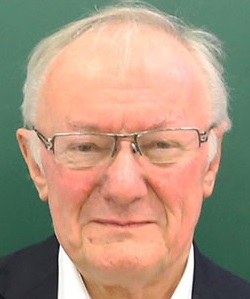 University College London, UK
|
 University of Maryland, USA
|
 Université catholique de Louvain, Belgium
|
About Us
The Regional Science Association International (RSAI), founded in 1954, is an international community of scholars interested in the regional impacts of national or global processes of economic and social change.


